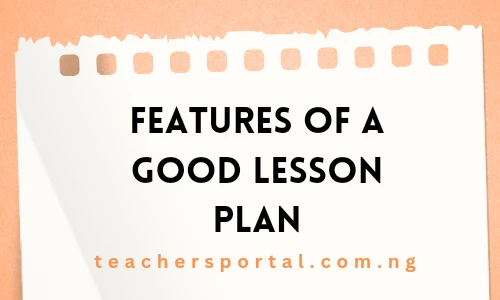In the article, we look at the definition and Features of a Good Lesson Plan. If you’re a teacher or student, and you have been in search of the qualities or attributes of a good lesson plan, look no further, because this article, has all you may need.
What is a Good Lesson Plan
A good lesson plan is a teacher’s daily guide for what pupils need to learn, how the lesson will be taught, and how learning will be measured. A good lesson plan helps a teacher be more effective in the classroom by providing a detailed outline to follow. It’s important to know that lesson plans come before lesson notes. Planning a lesson involves mental thinking as well as knowing how and what to get ready for the lesson. Lesson Plan is the mental thinking and preparations that metamorphose into the written plan, which we refer to as the lesson notes. Teachers should prepare mentally as well as get materials ready and think of how to present the lesson before writing the lesson notes.
Features of a Good Lesson Plan
A good lesson plan should consist of the following features:
- Behavioral Objectives
A good lesson plan should have a behavioral objective. The behavioral objective should be written in specific behavioral terms, stating exactly what the learner will be doing or saying when he demonstrates that he has achieved the goals of an instructional sequence. In setting up a good lesson plan, the teacher should be clear and definite in his mind about the desired learning outcomes. Here’s an example of a behavioral objective in agriculture:
“By the end of the lesson, the students will be able to: define and list five packaging methods of farm produce.”
- Content of the Lesson
Generally, the content of the lesson should be interesting, and it should be something the students can relate to. Also, a good lesson plan should show teaching techniques. It should also clearly state the various steps that the teacher is going to take through out the lesson, as well as the questions that will be asked in the course of the lesson.
- Builds upon Students’ Prior Knowledge
A good lesson must be built on or related to the pupil’s previous knowledge. Students should have an idea of the lesson or topic that’s been introduced. As a teacher, you may decide to start with a revision of a previous lesson because it’s related to the learning requirements of your lesson. You can also do a brief quiz or ask questions to tap into the preexisting knowledge of the students.
- Teaching Method
A good lesson plan should consist of suitable and appropriate methods for the subject matter to be taught. There are various teaching methods a teacher can employ to make his or her lesson more effective.
Some of such teaching methods include;
- Class Discussion
- Role Playing
- Group Work
- Brainstorming
- Field Trips
- Evaluation
Evaluation is a systematic process of collecting, analyzing, and interpreting information to determine the extent to which a pupil has understood a lesson or to know the extent to which the lesson objectives have been achieved. As teachers, it’s always important to evaluate every one of your lessons.
- Flexibility
A good lesson plan should allow for more flexibility. In order to meet students’ needs and interests and assist them in learning, teachers’ flexibility is needed. To allow for more flexibility, teachers’ lesson plans should also provide extra options or alternative tasks in case the unexpected happens. For example, if your material runs short, you have something to fall back on, among others.
- Give Time For Students’ Involvement
It’s important that when writing the lesson plan, teachers devote some time for students to think, interact, act, speak their minds, and enjoy learning together. In order to achieve your learning objectives quickly, it’s necessary that you allocate some time to students. This will make the class interesting and engaging.
- Conclusion/Summary
The lesson plan should include a conclusion and a summary for the whole lesson.
- Reference Material
A lesson plan becomes more useful if it refers to other reading materials. This can propel students to do extra reading.
- Assignments
A good lesson plan should contain an assignment. This will help the pupils understand the subject matter clearly.
- Make Use of Technology
In this day and age, it’s important to employ modern technology in the classroom, such as whiteboards and slideshow presentations. This will facilitate the teaching process and help your students understand that topic easily. It’s a good idea, as you plan your lesson, to incorporate some teaching aids that will help you achieve your desired objectives.
Advantages of a Lesson Plan
As a teacher or aspiring teacher, it’s necessary and advantageous to have a lesson plan. This will give you an idea of how to introduce the topic, how to develop the key concepts, how to correlate the concepts to real-life situations, how to conclude the lesson in order to effectively achieve the objectives of the lesson, and most importantly, how to write down your lesson notes.
Below here are some of the advantages of Lesson Plan
- Lesson plan makes teaching work more organized and systematic.
- Lesson plan instills confidence in teachers.
- Lesson plan makes the teacher conscious of the aim, which makes him conscious of the attitudes he wants to develop in his students.
- Lesson plan saves a lot of time.
- Lesson plan helps make connections between the concepts and the learners’ environment.
- Lesson plans provide freedom in teaching.
- Lesson plans make it possible for teachers to move in a scientific manner.
There are many advantages to lesson planning that can’t be covered here. In our next publication, we’ll be looking at at least forty advantages of a Lesson Plan. You can subscribe to our blog so you’ll be notified when the content is published.
